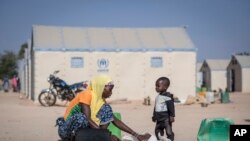The U.N. refugee agency says more than 700,000 people in Africa's Sahel region have fled attacks by militants and armed groups in the last 12 months, a 10-fold increase compared to January 2019.
Violence and mass displacement have become a way of life for millions of people in four of the Sahel’s most seriously affected countries — Mauritania, Mali, Niger and Burkina Faso. The number of displaced people within the region keeps growing as attacks by Islamist militants and other armed groups increase.
Burkina Faso is the epicenter of the violence. The U.N. refugee agency says recent attacks by militants on civilians and local authorities in the sprawling country are forcing more than 4,000 people on average to flee their homes every day in search of safety.
UNHCR spokesman Andrej Mahecic says an estimated 150,000 people have fled in the last three weeks.
"People fleeing violence report attacks on their villages by militant groups, killing, raping and pillaging. Terrified of these attacks, residents have left everything behind to find safety… We and our partners are facing severe challenges in accessing and responding to the needs of the internally displaced people and refugees scattered throughout the Sahel region, as attacks against civilians grow in number and frequency,” Mahecic said.
The UNHCR says more than 4,400 refugees from Niger have arrived in Mali, fleeing a recent string of attacks. It says a similar wave of violence has prompted an estimated 11,000 people to flee unsafe border areas.
The same phenomenon is occurring in Mali and Mauritania. Militant attacks are internally displacing civilians there or forcing them to flee to other countries in a region that essentially knows no borders.
Mahecic said survivors of attacks throughout the region need safety, shelter, food, water and other essentials, as well as psycho-social support for those who have fled or witnessed atrocities.
He said his agency is planning to ramp up its humanitarian response to deliver on these needs. He added the UNHCR will launch an appeal to international donors for support in the coming weeks.




